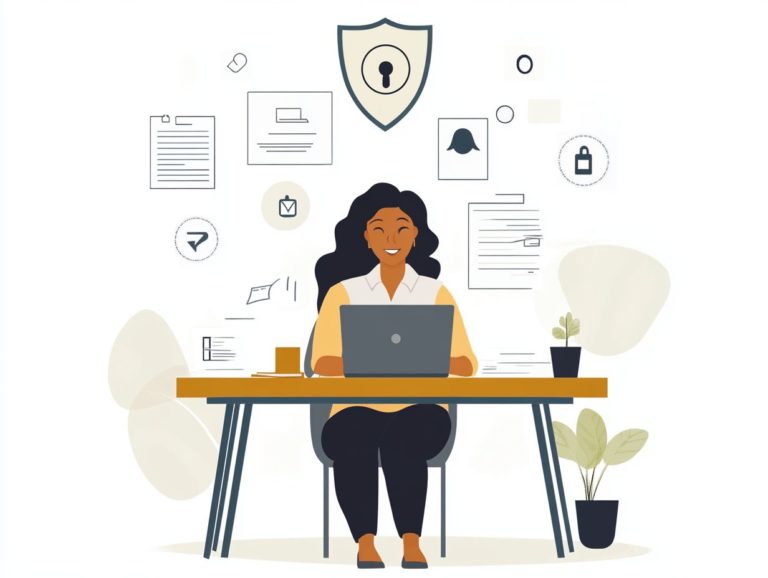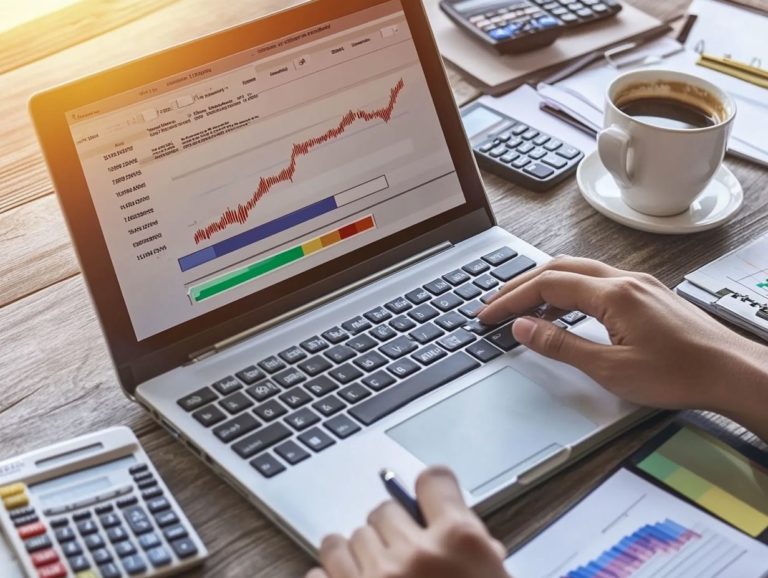10 Tips for Planning Large Purchases as a Freelancer
Contents
- Key Takeaways:
- 1. Know Your Budget and Stick to It
- 2. Prioritize Your Purchases
- 3. Research and Compare Prices
- 4. Consider the Long-Term Costs
- 5. Plan for Unexpected Expenses
- 6. Set Aside a Savings Fund for Large Purchases
- 7. Utilize Discounts and Deals
- 8. Consider the Return on Investment
- 9. Don’t Rush into a Purchase
- 10. Negotiate for Better Deals
- How Can Large Purchases Benefit a Freelancer?
- Frequently Asked Questions
- 1. What are the benefits of planning large purchases as a freelancer?
- 2. How should I prioritize my large purchases as a freelancer?
- 3. How can I budget for large purchases as a freelancer?
- 4. Is it better to save up or take out a loan for a large purchase as a freelancer?
- 5. What are some tips for negotiating the price of a large purchase as a freelancer?
- 6. How can I track my large purchases as a freelancer in the freelance economy?
Key Takeaways:
- Know your budget and stick to it to avoid overspending as a freelancer.
- Prioritize your purchases to focus on the most important items first.
- Research and compare prices to ensure you get the best deal on large purchases.
1. Know Your Budget and Stick to It
In today’s freelance economy, knowing your budget is vital for financial security. Gig workers with irregular income must manage their savings and expenses wisely.
Using strategies like the Profit First method can improve cash flow. This means saving a set percentage of your income first, creating a safety net while covering other expenses.
Regular financial reviews are crucial. They help freelancers understand spending habits and income sources, leading to better budgeting and financial literacy.
2. Prioritize Your Purchases
Freelancers need to prioritize purchases to keep cash flow steady. It’s important to differentiate between needs and wants to manage finances effectively.
Careful planning goes a long way. By considering both short-term needs and long-term benefits, freelancers can avoid impulse buying.
3. Research and Compare Prices
Researching prices is a key skill for freelancers. It helps avoid overspending and allows for wise investments that align with financial goals.
This step is essential for good budgeting. Freelancers can consult financial professionals for insights into market trends and expected investment returns.
4. Consider the Long-Term Costs
Freelancers must evaluate the long-term costs of purchases. Sound investment and cash management strategies greatly influence financial planning.
By understanding ongoing expenses, freelancers can create accurate budgets for future needs. For example, budgeting for health insurance helps anticipate premium changes.
Other important considerations include:
- Retirement contributions: Regular savings for retirement can ensure future stability.
- Equipment maintenance: Keeping tools in good shape avoids unexpected costs.
- Productivity tools: Investing in tools that boost productivity can save time and money.
By identifying these recurring expenses, freelancers can avoid financial pitfalls and establish realistic savings goals that address immediate needs while safeguarding their long-term financial health.
5. Plan for Unexpected Expenses
Preparing for unexpected expenses is crucial for freelancers. A robust emergency fund helps maintain cash flow during financial difficulties.
This ultimately leads to greater financial stability in the long run. By saving a predetermined amount in a savings account, freelancers can create a financial buffer.
This buffer not only compensates for lost income streams but also covers additional expenses like medical bills or essential repairs.
Regular financial check-ins are equally important. They enable individuals to document and evaluate their income and expenditures, ensuring they have a clear understanding of their cash flow.
This proactive approach makes it easier to identify any financial gaps in advance and adjust budgeting strategies swiftly.
6. Set Aside a Savings Fund for Large Purchases
Having a savings fund for major purchases as a freelancer is essential. It helps them reach their savings targets and budget effectively for significant expenses.
Freelancers can learn to save for big purchases by first identifying the specific items or experiences they wish to invest in. Then, they can set clear financial goals.
Next, creating a detailed budget will determine how much they can reduce other expenditures. This enables them to consistently set aside money toward these savings objectives.
Financial counselors recommend allocating a predetermined percentage of income to this savings fund. This ensures that saving is prioritized rather than treated as an afterthought.
Utilizing high-yield savings accounts can further assist freelancers by generating interest. This helps enhance their savings and brings their goals closer while fostering good financial management habits.
7. Utilize Discounts and Deals
Freelancers can enhance their financial planning by taking advantage of discounts and deals. This can aid in cash flow management and positively influence their spending habits.
Incorporating various strategies—such as using coupon apps, subscribing to newsletters from favorite retailers, and utilizing price comparison websites—can maximize their budgets.
Taking these actions can turbo-charge your financial planning! Exploring seasonal sales, participating in loyalty programs, or even negotiating with service providers are effective ways to secure reductions.
As freelancers adopt these practices, they improve their short-term financial situations while enhancing their overall financial literacy.
8. Consider the Return on Investment
Assessing the return on investment (ROI) for significant purchases is crucial for freelancers. This practice enables them to make informed decisions that align with their financial goals and risk tolerance.
Evaluating the potential returns and risks associated with various investments helps freelancers identify which options are more likely to yield positive outcomes.
Financial professionals can offer valuable insights into these decisions. This ensures that they are based on solid data rather than speculation.
Understanding their risk tolerance is essential. It helps freelancers determine whether they are comfortable with market volatility or prefer safer alternatives.
9. Don’t Rush into a Purchase
For freelancers, taking time before making a purchase is crucial. It allows them to gather financial advice, evaluate their expense tracking, and refine their budgeting methods.
This thoughtful approach ensures that significant purchases are intentional and justified. By doing so, freelancers can reduce the risk of impulse buying.
Impulse buying often leads to buyer’s remorse and financial distress.
10. Negotiate for Better Deals
Negotiating for better deals is a vital skill for freelancers. It greatly impacts cash flow and helps maintain a budget that promotes healthy spending.
By mastering effective negotiation techniques, freelancers can secure better rates. Knowing their worth and presenting a strong case helps build lasting client relationships.
This can lead to repeat business and referrals, boosting their income significantly. These strategies also help freelancers plan project costs and timelines more accurately.
Enhanced negotiation skills boost financial stability. They empower freelancers to invest in personal and professional growth.
How Can Large Purchases Benefit a Freelancer?
Investing in large purchases can greatly enhance a freelancer’s productivity. Quality tools and resources lead to better financial outcomes when paired with smart investment strategies.
When freelancers buy high-quality equipment or software, they streamline their work. This improvement fosters higher client satisfaction and retention, crucial for a stable income.
Experts recommend careful planning around major purchases. Aligning these with growth strategies can turn expenses into long-term revenue sources.
Regularly reviewing the need and impact of such investments is essential.
What Are the Most Common Large Purchases for Freelancers?
Common purchases include equipment, software, and services that affect business costs. Freelancers should evaluate investment opportunities carefully.
These items enhance productivity and keep freelancers competitive. High-end laptops or cameras can significantly improve output, while subscription software streamlines workflows.
Understanding the long-term benefits is crucial to avoid impulsive decisions. Careful planning ensures freelancers invest without jeopardizing their financial stability.
How Can a Freelancer Budget for Large Purchases?
Freelancers can budget for large purchases using key strategies. These include setting savings goals and conducting regular financial check-ins.
Strategic Budgeting Techniques: Start by reviewing total income and expenses. This gives a clear financial overview, including net income after taxes and monthly costs.
Identify non-essential spending to free up funds for purchases. Reducing these expenses can help save more effectively.
Separate Savings Account: Create a dedicated savings account for large purchases like a car or computer. This helps focus on savings and reduces impulsive spending.
Emergency Fund: Include an emergency fund in budgeting. This ensures significant purchases won’t compromise financial stability during tough times.
Regular Financial Check-Ins: Frequently review spending and adjust as needed. This keeps freelancers aligned with their financial goals.
What Are Some Tips for Saving Money on Large Purchases?
Freelancers can maximize their finances on large purchases by following sound financial advice, strategically leveraging discounts, and adjusting their spending habits to align with their budgeting strategies.
The first step is to implement budgeting tips, such as tracking expenses. By closely monitoring their spending, freelancers can identify areas where they can cut back and save for significant purchases. For instance, if a freelancer realizes they are spending a lot on dining out, they can opt to cook at home more often. This way, they can set aside those savings for a new computer that may be essential for their work.
Timing your purchases right can save you a lot of money! For example, buying an air conditioning unit in winter or a snowblower in summer will likely save you money. Major holiday shopping seasons are among the best times to make purchases, as businesses often offer significant sales. Freelancers should research which retailers offer the best prices. Websites like PriceGrabber and Google Shopping compile prices from various retailers, making it easy to find the best deals.
Searching for promo codes online can uncover discounts that can be applied at checkout, further reducing the purchase price.
If buying from a physical store, freelancers can ask the sales representative if they can negotiate a better price, especially if they have found a lower price elsewhere. For example, if a freelancer is purchasing a sofa from a furniture store and discovers a similar one for less at another retailer, they can inquire whether the store can match that price. Sometimes, the retailer may even offer free delivery or assembly. This is particularly true for small retailers that operate on thin profit margins and may be willing to negotiate to secure a sale.
Cultivating healthy spending habits is crucial for freelancers, as it helps them make informed choices and ensures a more sustainable financial future. When considering large purchases, it’s essential to evaluate whether the item is truly necessary and how it aligns with long-term financial goals. For instance, acquiring a new designer handbag may satisfy a personal desire, but it does not have the same financial impact as buying a new laptop that can help the freelancer work better.
How Can a Freelancer Determine If a Large Purchase Is Necessary?
Determining the necessity of a large purchase falls within the broader financial planning category of investment evaluation. Investment evaluation means looking closely at whether the purchase is worth it in the long run. This process involves assessing the potential opportunity and ensuring it aligns with the company’s risk tolerance and overall business objectives.
When deciding to acquire a significant asset, it is essential to consider not only the immediate effects on cash flow but also how this decision will influence the business’s long-term financial trajectory.
For instance, a business might evaluate expected returns, the impact on future cash flow, and whether the purchase aligns with a strategy for sustainable growth. Best practices for planning large purchases include:
- Conducting thorough market research to identify the optimal time and place to acquire the asset
- Determining the appropriate price
- Consulting with financial advisors to help clarify the long-term implications of the purchase
Finally, establishing clear milestones and benchmarks is crucial for defining success after the acquisition has been made.
What Are the Potential Risks of Large Purchases for Freelancers?
Large purchases can pose significant risks to freelancers by affecting cash flow management and potentially depleting emergency savings if not carefully planned. Additional risks associated with these purchases include a loss of financial flexibility, which can make it more challenging to respond to unexpected emergencies or seize financial opportunities.
Furthermore, such purchases may lack alignment with established budgeting methods, potentially disrupting overall financial health and leading to stress and uncertainty.
To mitigate these risks, consulting with financial professionals can be beneficial. Their expertise can help individuals develop personalized strategies that ensure larger purchases support broader financial goals.
Frequently Asked Questions
Start applying these tips today and watch your savings grow!
1. What are the benefits of planning large purchases as a freelancer?
Planning large purchases helps freelancers manage their finances and avoid overspending. It allows for budgeting and saving for future expenses.
2. How should I prioritize my large purchases as a freelancer?
Prioritize your needs to maximize your budget and enjoy your freelance journey! Make a list of essential items and rank them based on your budget and current situation.
3. How can I budget for large purchases as a freelancer?
Set a realistic budget and stick to it. Consider your income and expenses, and allocate a specific amount each month for your large purchases. This will help you save and avoid overspending.
4. Is it better to save up or take out a loan for a large purchase as a freelancer?
It’s always better to save for a large purchase rather than take out a loan. Loans come with interest and can add to your financial burden. Saving helps you avoid debt and ensures you have enough money to cover your needs without stress.
5. What are some tips for negotiating the price of a large purchase as a freelancer?
Do your research beforehand and compare prices from various vendors. Use this information to negotiate a better deal. Paying in cash or upfront can also lead to larger discounts, enhancing your cash flow management.
Having an emergency fund—savings set aside for unexpected expenses—is vital for your financial planning. Explore investment opportunities and strategies like the Profit First method to boost your wealth management. Understanding your risk tolerance and implementing budgeting tips will help you achieve your savings goals and enhance your financial literacy as a gig worker or 1099 contractor.
Consult a tax professional to assist with quarterly tax estimates and major purchase planning to ensure financial stability. Act now to save money for your future purchases!
6. How can I track my large purchases as a freelancer in the freelance economy?
Start using budgeting tools today to track your purchases and master your finances! This will help you stay on top of your finances and make informed decisions about future purchases, aligning with your financial goals and cash management strategy.






